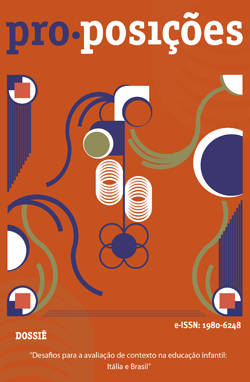Abstract
The article analyzes the use of diaries on the writing of the history of youth, establishing a dialogue between two documents, written by Brazilian women who were transitioning from childhood to adulthood in the late 19th century. On the one hand, the article analyzes the conditions of production, conservation, and publication of the diaries. On the other hand, it focuses on the authors’ social experiences, considering their generational and gender identities, as well as their social and racial contexts and their familial relationships. By studying these diaries, it is possible to apprehend the possibilities and limits of social participation of the young women of that period, observing the singularities of each narrative.
References
Alencastro, A. (1997). Vida privada e ordem privada no Império. In História da vida privada no Brasil (Vol. 2, pp. 32-67). São Paulo: Companhia das Letras.
Archad, D. (1998). John Locke’s children. In S. Turner (Org). The philosophy child (pp. 85-104). Rochester: New York Rochester Press.
Bastos, M. H. C. (2000). Leituras da ilustração brasileira: Samuel Smiles (1812-1904). Ícone, 6(1), 117-134.
Blauvelt, M. (2002). The work of the heart: emotion in the 1805-1835 diary of Sarah Connell Ayer. Journal of Social History, 35(3), 577-592.
Bourdieu, P. (1983). A juventude é apenas uma palavra. In Questões de sociologia (pp. 112-121).
Bruner, J. (1983). In search of mind: essays in autobiography. New York: Harper & Row.
Castro, C. (2009). Introdução. In B. M. Magalhães. O diário de Bernardina: da Monarquia à República pela filha de Benjamim Constant (pp. 7-35). Rio de Janeiro: Zahar.
Cox, R. (1996). Shaping childhood: themes of uncertainty in the history of adult-child relations. London: Routledge.
Del Priore, M. (Org.). (1997). História das mulheres no Brasil. São Paulo: Contexto.
Del Priore, M. (Org.). (2005). História do amor no Brasil. São Paulo: Contexto.
Del Priore, M. (Org.). (2010). História das crianças no Brasil. São Paulo: Contexto.
D’Incao, M. A. (1997). Mulher e família burguesa. In M. Del Priore. História das mulheres no Brasil (pp. 223-240). São Paulo: Contexto.
Ferraro, A. (2002). Analfabetismo e níveis de letramento no Brasil: o que dizem os censos? Educação e Sociedade, 23(81), 21-47.
Figueiredo, L. (1997). Barrocas famílias: a vida familiar em Minas Gerais no século XVIII. São Paulo: Hucitec.
Freire, V. B., Zecca, R. V., & Penello, P. R. (2012). Educação musical da mulher no segundo reinado. Anais do II Simpósio Nacional de Musicologia, Pirenópolis. Recuperado de http://www.academia.edu/3407934/Educa%C3%A7%C3%A3.
Freyre, G. (2000). Os ingleses no Brasil. Rio de Janeiro: Topbooks.
Furtado, J. (2003). Chica da Silva e o contratador de diamantes. São Paulo: Companhia das Letras.
Gouvea, M. C. (2004). Os fios de Penélope: a mulher e a educação feminina no século XIX. In L. Faria Filho, & R. Fernandes (Orgs.) História da criança: materialidades, práticas e representações (pp. 105-132). Belo Horizonte: Autêntica.
Graff, H. (1997). Conflicting paths: growing up in America. Cambridge: Harvard University Press.
Jinzenji, M. (2012). Leituras e escritas femininas no século XIX. Cadernos Pagu, (38), 367-394.
Leite, M. M. (1997). Livros de viagem (1803-1900). Rio de Janeiro: Editora UFRJ. Lejeune, P. (2008). O pacto autobiográfico: de Rousseau a internet. Belo Horizonte: Editora UFMG.
Lejeune, P. (2009). On diary. Mānoa: University of Hawai’i Press.
Levi, G., & Schimitt, J. (1996). Introdução. In História dos jovens (Vol. 1, pp. 7-32). São Paulo: Companhia das Letras.
Louro, G. L. (1997). Mulheres na sala de aula. In M. Del Priore (Org.). História das mulheres no Brasil (pp. 443-482). São Paulo: Contexto.
Magalhães, B. M. (2009). O diário de Bernardina: da Monarquia à República pela filha de Benjamim Constant. Rio de Janeiro: Zahar.
Mannheim, K. (1952). The problem of generations. In Essays on the sociology of knowledge. London: RKP.
Meyer, M. (2006). Uma tradução e suas circunstâncias. Literatura e Sociedade, 11(9), 278-290.
Morley, H. (1971). Minha vida de menina. Rio de Janeiro: José Olympio.
Motta, A. B. (1999). As dimensões de gênero e classe social na análise do envelhecimento. Cadernos Pagu, (13), 191-221.
Motta, A. B. (2010). A atualidade do conceito de gerações na pesquisa sobre envelhecimento. Sociedade e Estado, 25(2), 225-250.
Perrot, M. (1998). Mulheres públicas. São Paulo: Unesp.
Pinsky, C. (2009). Estudos de gênero e história social. Estudos Feministas, 17(1), 159-189.
Pinto, H. (2016). Entre a casa e a rua: uma história da mocidade de Diamantina-MG no final do século XIX. Tese de Doutorado, Universidade Federal de Minas Gerais, Belo Horizonte.
Qvortrup, J. (2011). Nove teses sobre a “infância como um fenômeno social”. Pro-Posições, 22(1), 199-211.
Samara, E. M. (1989). As mulheres, o poder e a família: São Paulo, século XIX. São Paulo: Marco Zero. Schwarcz, L. M. (2017). Lima Barreto: triste visionário. São Paulo: Companhia das Letras. Schwarz, R. (1997). Duas meninas. São Paulo: Companhia das Letras.
Siegel, A. (2005). The idea of self. Cambridge: Cambridge University Press.
Swindells, J. (Org.). (1995). The uses of autobiography: feminist perspectives of the past and present. London: Routledge.
Tebbutt, M. (2016). Making youth: a history of youth in modern Britain. London: Palgrave
Theriot, N. (1996). Mothers & daughters in nineteenth-century America: the biosocial construction of femininity. Lexington: University Press of Kentucky.
Tilly, L. (1994). Gênero, história das mulheres e história social. Cadernos Pagu, (3), 29-62.
Turmina, A., & Shiroma, E. (2014). “Se você não mudar, morrerá”: a (con)formação de um trabalhador de novo tipo no discurso de autoajuda. Revista Brasileira de Educação, 19(56), 165-180.
Veiga, C. G. (2009). Elaboração de hábitos civilizados na constituição das relações entre alunos e professores (1827-1927). Revista Brasileira de História da Educação, 9(3), 61-92.
Veiga, C. G., & Lacerda, T. B. S. (2014). Presiones por la moralidad de los profesores: Brasil, siglos XVIII-XX. Clío & Asociados: La Historia Enseñada, (18-19), 106-124.
A Proposições utiliza a licença do Creative Commons (CC), preservando assim, a integridade dos artigos em ambiente de acesso aberto.


